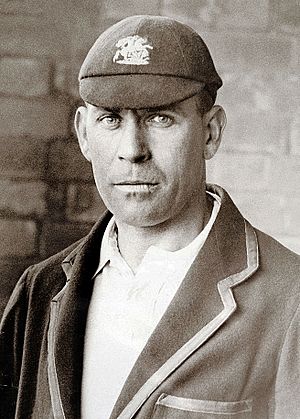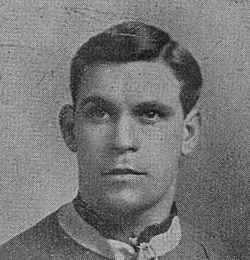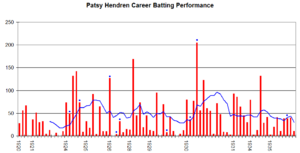Patsy Hendren facts for kids

Hendren in about 1924
|
||||||||||||||||||||||||||||||||||||||||
| Personal information | ||||||||||||||||||||||||||||||||||||||||
|---|---|---|---|---|---|---|---|---|---|---|---|---|---|---|---|---|---|---|---|---|---|---|---|---|---|---|---|---|---|---|---|---|---|---|---|---|---|---|---|---|
| Full name |
Elias Henry Hendren
|
|||||||||||||||||||||||||||||||||||||||
| Born | 5 February 1889 Turnham Green, Middlesex |
|||||||||||||||||||||||||||||||||||||||
| Died | 4 October 1962 (aged 73) Tooting Bec, London |
|||||||||||||||||||||||||||||||||||||||
| Batting | Right-handed | |||||||||||||||||||||||||||||||||||||||
| Bowling | Right-arm off-break | |||||||||||||||||||||||||||||||||||||||
| International information | ||||||||||||||||||||||||||||||||||||||||
| National side | ||||||||||||||||||||||||||||||||||||||||
| Test debut (cap 181) | 17 December 1920 v Australia | |||||||||||||||||||||||||||||||||||||||
| Last Test | 18 March 1935 v West Indies | |||||||||||||||||||||||||||||||||||||||
| Career statistics | ||||||||||||||||||||||||||||||||||||||||
|
||||||||||||||||||||||||||||||||||||||||
|
Source: CricInfo, 6 December 2019
|
||||||||||||||||||||||||||||||||||||||||
Elias Henry Hendren (born February 5, 1889 – died October 4, 1962), known as Patsy Hendren, was a famous English cricketer. He played for Middlesex and the England team from 1907 to 1937. Patsy was also a talented footballer and played for Brentford F.C. for many years.
He was born in Turnham Green and passed away in Tooting Bec. Patsy was a right-handed batsman and sometimes bowled off breaks. He was one of the best batsmen between the World Wars. He scored an average of 47.63 runs in his 51 Test matches. In all his first-class matches, he averaged 50.80 runs.
Patsy Hendren scored a huge total of 57,611 runs in first-class cricket. This is the third highest total ever. He also made 170 centuries, which is the second highest number. He was good friends with Jack Hobbs, who holds the record for most centuries. Patsy was known for his humor and enjoyed playing jokes on people.
Contents
Patsy Hendren's Cricket Journey
Starting Out in Cricket
Patsy Hendren began his cricket career at the age of 16. He joined the groundstaff at Lord's, a famous cricket ground. In 1907, he played his first first-class game for Middlesex. However, the game was stopped early, so he didn't get to bat.
The next year, he played nine games and slowly became a regular player. It took until 1911 for him to score his first century (100 runs in one innings). Before World War I paused the County Championship, he never averaged more than 40 runs in a season. During the war, Hendren worked in a factory making weapons.
Becoming a Cricket Star
When cricket started again in 1919, Hendren played amazingly well. He scored 1,655 runs and averaged over 60. He did this again the following year. He was very good at facing fast bowlers.
Because of his great performance, he was named a Wisden Cricketer of the Year in 1920. He was then chosen to play for England in the 1920/21 Ashes tour in Australia. He made his Test debut at Sydney. He scored 58 runs in his second innings, even though Australia won by a lot. He scored two more half-centuries in that series.
He kept his spot for the 1921 series against Australia. However, he didn't do well in that series, scoring only 17 runs in four innings.
Years of Success
The year 1923 was very successful for Hendren. He scored 3,010 runs and made 13 centuries. He was called back to the England team the next year. He averaged an amazing 132.66 runs against South Africa.
He continued to do well, averaging over 56 runs every year from 1922 to 1928. In both 1927 and 1928, he again made 13 centuries. In 1928, he scored his highest number of runs in a single season: 3,311 runs.
In 1929/30, Hendren toured the West Indies with the England team. He scored 693 runs in the series, averaging 115.50. This included his highest Test score, 205 runs not out, in Port of Spain. His overall first-class average for that tour was 135.76. He made six half-centuries in a row in Test matches. This was a new record for England at the time.
Back in England, he only managed a top score of 72 against Australia. But in 1933, at 44 years old, he scored over 3,000 runs for the third and final time. He also made his highest ever score of 301 runs not out.
Inventing a Helmet
In 1933, Patsy Hendren came up with a type of helmet. He wore a rubber hat with three peaks when playing against the West Indies at Lord's. Two of these peaks covered the sides of his head. He was good at hitting fast bowling, but he felt he needed more protection from very quick bowlers.
Later Cricket Years
His last Test match was in 1934/1935 in Kingston, Jamaica. In that game, George Headley scored 270 runs not out, helping the West Indians win the series. Hendren continued to play well in local cricket for a few more years.
His final season was in 1937. It was fitting that he scored a century in his last County Championship match. This was a local game against Surrey. He did play one more first-class innings in 1938, at age 49. He was caught out for zero runs by 20-year-old Denis Compton.
After retiring, he coached cricket at Harrow School and Sussex. Later, he worked as a scorer for Middlesex from 1952 to 1960. His health failed, and he passed away in a hospital in London at the age of 73.
Patsy Hendren's Football Career

Hendren in 1920
|
|||
| Personal information | |||
|---|---|---|---|
| Position(s) | Wing Forward | ||
| Senior career* | |||
| Years | Team | Apps | (Gls) |
| 1906–1907 | Sandersons | ||
| 1907 | Queens Park Rangers | 0 | (0) |
| 1907–1908 | Brentford | 1 | (0) |
| 1908–1909 | Manchester City | 2 | (0) |
| 1909–1911 | Coventry City | 33 | (14) |
| 1911–1927 | Brentford | 399 | (69) |
| Total | 435 | (83) | |
| International career | |||
| 1919 | England | 1 | (0) |
| *Club domestic league appearances and goals | |||
Early Football Days
Hendren started playing football for a local team called Sandersons in 1906. After that, he played for Queens Park Rangers and Brentford in the Southern Football League.
In 1908, Brentford sold him to Manchester City. He played two games for them in the Football League First Division. In October 1909, he moved to Coventry City. He had a good first season there, playing 29 games and scoring 13 goals. However, he only played 4 games in the 1910–11 season.
Playing for Brentford
At 22 years old, Hendren returned to Brentford for the 1911–12 season. He played both cricket and football at the same time. This meant he sometimes missed the first games of the football season. For example, he only played two games in the 1920–21 season because he was on tour in Australia for cricket. He also missed the entire 1924–25 season for the same reason.
During his 15 years with Brentford, the club moved from the Southern League to the Football League. He retired from football at age 38 to focus on cricket. He played a total of 432 games for Brentford and scored 74 goals. In 2015, he was added to the Brentford F.C. Hall of Fame after his death.
International Football
Hendren played one game for the England in an unofficial match. This was a "Victory International" game against Wales in October 1919.
Personal Life
Patsy had a brother named Denis Hendren who also played cricket for Middlesex. Another brother, John, sadly died in July 1916 during World War I. Patsy Hendren was a Catholic.
Football Achievements
Brentford
- London Combination: 1918–19
 | Selma Burke |
 | Pauline Powell Burns |
 | Frederick J. Brown |
 | Robert Blackburn |


